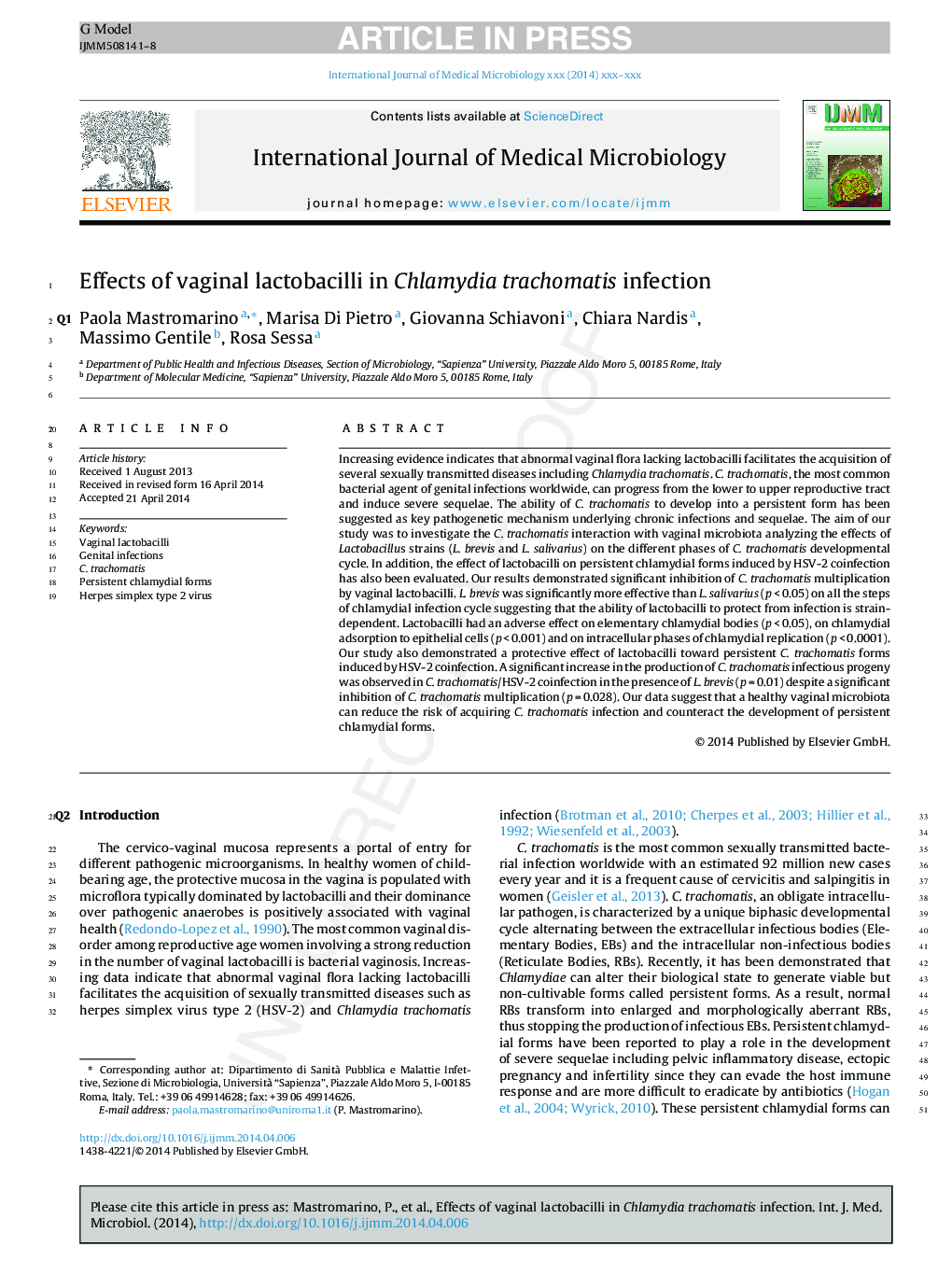| کد مقاله | کد نشریه | سال انتشار | مقاله انگلیسی | نسخه تمام متن |
|---|---|---|---|---|
| 8385646 | 1543694 | 2014 | 8 صفحه PDF | دانلود رایگان |
عنوان انگلیسی مقاله ISI
Effects of vaginal lactobacilli in Chlamydia trachomatis infection
ترجمه فارسی عنوان
اثر لاکتوباسیله واژینال در عفونت کلامیدیا تراکوماتیس
دانلود مقاله + سفارش ترجمه
دانلود مقاله ISI انگلیسی
رایگان برای ایرانیان
کلمات کلیدی
موضوعات مرتبط
علوم زیستی و بیوفناوری
بیوشیمی، ژنتیک و زیست شناسی مولکولی
بیوشیمی، ژنتیک و زیست شناسی مولکولی (عمومی)
چکیده انگلیسی
Increasing evidence indicates that abnormal vaginal flora lacking lactobacilli facilitates the acquisition of several sexually transmitted diseases including Chlamydia trachomatis. C. trachomatis, the most common bacterial agent of genital infections worldwide, can progress from the lower to upper reproductive tract and induce severe sequelae. The ability of C. trachomatis to develop into a persistent form has been suggested as key pathogenetic mechanism underlying chronic infections and sequelae. The aim of our study was to investigate the C. trachomatis interaction with vaginal microbiota analyzing the effects of Lactobacillus strains (L. brevis and L. salivarius) on the different phases of C. trachomatis developmental cycle. In addition, the effect of lactobacilli on persistent chlamydial forms induced by HSV-2 coinfection has also been evaluated. Our results demonstrated significant inhibition of C. trachomatis multiplication by vaginal lactobacilli. L. brevis was significantly more effective than L. salivarius (p < 0.05) on all the steps of chlamydial infection cycle suggesting that the ability of lactobacilli to protect from infection is strain-dependent. Lactobacilli had an adverse effect on elementary chlamydial bodies (p < 0.05), on chlamydial adsorption to epithelial cells (p < 0.001) and on intracellular phases of chlamydial replication (p < 0.0001). Our study also demonstrated a protective effect of lactobacilli toward persistent C. trachomatis forms induced by HSV-2 coinfection. A significant increase in the production of C. trachomatis infectious progeny was observed in C. trachomatis/HSV-2 coinfection in the presence of L. brevis (p = 0.01) despite a significant inhibition of C. trachomatis multiplication (p = 0.028). Our data suggest that a healthy vaginal microbiota can reduce the risk of acquiring C. trachomatis infection and counteract the development of persistent chlamydial forms.
ناشر
Database: Elsevier - ScienceDirect (ساینس دایرکت)
Journal: International Journal of Medical Microbiology - Volume 304, Issues 5â6, July 2014, Pages 654-661
Journal: International Journal of Medical Microbiology - Volume 304, Issues 5â6, July 2014, Pages 654-661
نویسندگان
Paola Mastromarino, Marisa Di Pietro, Giovanna Schiavoni, Chiara Nardis, Massimo Gentile, Rosa Sessa,
